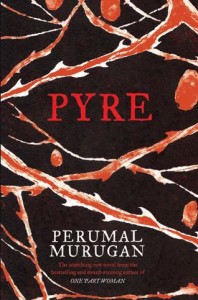by Anupama Krishnakumar
Some books leave you mulling over them days after you have finished reading them. Perumal Murugan’s ‘Pyre’ (Penguin Hamilton/April 2016) turned out to be one such. Translated from the Tamil original “Pookuzhi” published in 2013, by Aniruddhan Vasudevan, the book is an intense read.
Two things hit you hard as you read Pyre – one, a powerful love story; two, the wrath that caste can generate. Pyre is the story of Saroja and Kumaresan, who fall in love and unite in an inter-caste marriage performed in secrecy. They step into Kumaresan’s village hoping that all would end well once the initial upheavals about their ‘out-of-the-way’ wedding subsided. However, in spite of Kumaresan putting up a confident front, repeatedly stating that Saroja belonged to the same caste as theirs, the villagers’ growing suspicion about Saroja’s caste culminates in hatred of epic proportions.
For someone who has seen Tamil films of yesteryears, this isn’t a totally new story. But what makes reading Pyre an engaging experience is the way it is written. The careful and effective use of words conjure images and scenes in front of your eyes.
The gentle descriptions of the passionate love that binds Saroja and Kumaresan are poetic and leave a smile on your face. When Saroja sets foot on the rock, Perumal Murugan writes, “it touched her with the combined sensation of Kumaresan’s soft hands and his rough embrace, the memory of which made her shiver with pleasure every time she walked on the rock’s surface.” He also deftly captures the ordinariness of the life of two people by focusing on the minute details.
Aniruddhan’s translation is pristine like a clear sheet of glass and shines extraordinarily in some places. The Tamilian essence is preserved beautifully. As someone who speaks Tamil, the Tamil lines automatically form in your head even as you are reading the English translation. That’s just what happens when you read Saroja’s brother’s words of endearment, “My piece of gold…my little calf”. The Tamil words “Thanga katti” and “Kannu Kutty” dance in front of your eyes.
The characters are striking and well-etched. They have distinct qualities. You can’t miss Kumaresan’s practical nature, his quiet confidence and his jovial side. His reassurances, expectations and disappointments are hard hitting. Like when he comes home drunk one night and “the stench of arrack laid bare the extent of his inner turmoil.” Or when he worries whether Saroja will “splutter and wither like a little sesame seed.”
The strong characterisation of Marayi, Kumaresan’s mother, has the desired effect. Her stubbornness and lamentations succeed in annoying you. Marayi is also a depiction of how the mind of a widowed mother is shaped by the society she moves in. Her hatred for Saroja cannot be missed when she says, “Here she stands on top of his grave, lush like the erukku shrub. I cannot bear to look at this plant.”
The things that the villagers say of Saroja make you cringe in disbelief. “That fair-skinned girl must have spread her legs for our Nondi!”, someone says. “Can a mother and wife ever be equal?” says another. “Yes, all our bodies are withered, exposed to the elements. But hers is still golden. Why don’t you wrap her around your neck?” that’s a woman talking. The insinuations shock you, the sort of verbal assault meted out to a woman – the sharp tongues that wag needlessly and just how helpless a woman can be in these situations – make you squirm. And when reading Pyre, you realise how it’s not just the men but also women themselves who make life miserable for another woman. Like the old woman who asks, “Why were you in such a hurry, Aaya? Did our Nondi boy give you a little something in your womb?” The utter helplessness of Saroja, her anxieties, her regrets and the suffocation she goes through as she lies huddled inside the hut “like a dried leaf” hurt like a raw wound.
Like fireflies in the dark though, Murugan inserts little flashes of hope and joy that temper the burning tension in the story. A good instance would be when Kumaresan draws her close and murmurs, “You’ll fit within the palm of my hand.” Or when Saroja shivers in delight as he calls her “my dear…”
There’s a village that comes alive with Murugan’s words and sooner or later, you are drawn into the pages. You feel the heat and dust of poverty, witness the leer and jeer of men, sense the burning hate, see colourful soda bottles and hears hit Tamil songs from the 80s on the radio.
Kumaresan and Saroja’s story moves at a brisk pace and before you realise, you have turned the last page. Reading the well-translated version of a stirring story has only sown the seeds of desire to go back and read the original in Tamil.





